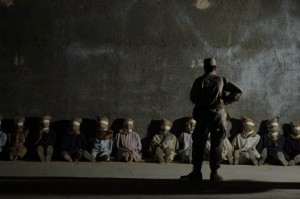Review – Road to Guantanamo
Arts & Culture - Posted on Thursday, May 29, 2008 15:52 - 0 Comments
Review – Road to Guantanamo (dir. Michael Winterbottom)
by Alistair Nixon
In Ian McEwan’s Saturday, Henry Perowne speaks of September 11th 2001 as his eighteen year old son’s induction into international affairs; “his initiation, in front of the TV, before the dissolving towers was intense, but he adapted quickly.” It is a statement that is true certainly for me and also for many of our generation. But the September 11th attacks were only part of the induction.
A counterpoint to the images of the “dissolving towers”, were the equally resonant images of the Guantanamo Bay detainees, removed not just from international law, but also, by insulation, from the environment surrounding them – kneeling, bound, jump-suited blobs of orange, their eyes, nose, ears, hands and mouths rendered obsolete with masks, headphones and gloves. They were the dehumanised victims of a scared and vengeful giant, divested of their most basic human rights – unpeople, as author Mark Curtis put it recently.
Michael Winterbottom’s latest film, The Road to Guantanamo, forcefully asserts the Person within that sensory deprivation kit. It comes at a time when Guantanamo is no longer news. Tony Blair summed up its position well at a recent press conference, referring to it as an “anomaly”. The horrors of Guantanamo have become part of the fabric of every day life. Thankfully, this film puts it back on the agenda. The story is based upon the account of three British detainees at Guantanamo – the so-called Tipton Three, Ruhal Ahmed, Shafiq Rasul, and Iad Asif Iqbal. Travelling to Pakistan for a wedding, they enter in to Afghanistan at the same time American bombing commences. As bombing intensifies, they attempt to get back to Pakistan, but instead become wound up with Taliban fighters, before their arrest by Americans. The Tipton Three spent just over two years at Guantanamo Bay.
The film cuts between the dramatised escapades of the young, clean shaven youths laughing and joking at the quirky otherworldliness of Afghanistan – with occasional flash backs to happier times; flirting with girls at Pizza Hut, riding scooters around a Tipton park – and interviews with their current, thick bearded counterparts. When captured, Ahmed and Iqbal were both 22, Rasul was 24. (Of course, they were by no means the youngest detainees, America having admitted to only recently releasing a 13 and 15 year old.). While our induction to international affairs was watching the horror, theirs was living it. The location filming in Pakistan, Afghanistan and Iran adds a great deal of believability to the film, as does the mock-up of Guantanamo itself. But as noted earlier, this is not a documentary; it is the dramatised account of the protagonists’ time in Afghanistan and Guantanamo. This is, of course, a partisan account; but it is our best opportunity to hear from those who have been inside Guantanamo Bay. By denying access to Guantanamo to lawyers, aid workers and journalists, the Bush administration has done harm to any defence they may have. Commentators such as David Aaronovitch have noted factual inaccuracies during parts of the film, such as the claim that the teenagers entered Afghanistan before the American bombing started (when in fact it was after).
Beginning the film is a clip of George Bush proclaiming that inside Guantanamo are the ‘bad guys.’ The film maintains the Tipton Three were completely innocent; but if the Tipton Three were not hapless youths, who somehow strayed into Afghanistan, but had gone with the intent of aiding Bin Laden in an assault on the West, would their treatment at Guantanamo have been warranted? The film provides an indirect answer to this question. We are not just witness to the conditions inside the camp, but also the interrogations. They are farcical. So much time and energy is expelled in to dragging a confession from the detainees, that the entire point of the exercise – extracting information on Al Qaeda- is forgotten. At one point, Ahmed is shown a video of a Bin Laden rally in Afghanistan in the year two-thousand. “I see you on the tape,” the interrogator snarls. Ahmed argues it couldn’t have been him, “I was working at Curry’s all of 2000″; but still, the interrogator persists. “How could you have been, if I can see you on the tape?” With interrogators like these, who needs enemies? The scenes at Guantanamo are full of black comedy. They go to show that Guantanamo is indeed an ‘anomaly’. But it is not just a moral or legal anomaly; the practices within Guantanamo fly in the face of rational thought. Regardless, the anomaly that is Guantanamo Bay will blot the consciences of many subsequent generations free from the smoke and haze of the collapsed twin towers. The question, however, is who will feel the most shame? Those who believe Guantanamo is necessary for world security; or those of us whose protests against Guantanamo have amounted to nothing more than mere indignant huffing and puffing. There have been no major protests; Camp Delta has been allowed to slip off the radar. The Road to Guantanamo is of the utmost importance in reminding us what an abomination the prison is, and of the urgency required in doing something to help those who are still trapped within its walls.
Road to Guantanamo is available to buy on DVD, priced £15.99



Leave a Reply